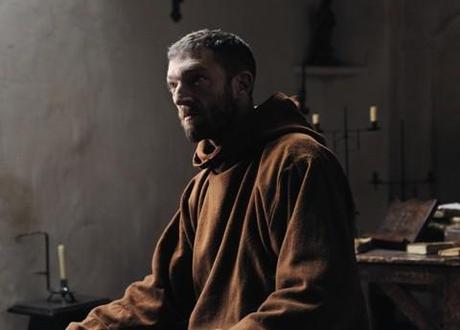
Vincent Cassel as the reprobate monk in Le Moine.
After recent star turns as an anti-hero robber-cum-terrorist in the eponymous Mesrine, as well as the bullying ballet choreographer in Black Swan, French actor Vincent Cassel’s sleepy eyes and irascible smirk have come to define a specific kind of menacing passion — as well as a passionate menace. In The Monk (Le Moine), directed by Dominic Moll, Cassel is perfectly cast as one of literature’s most despicable villains: the lapsed and murderous Capucino Ambrosio, from Matthew Lewis’s scandalising 18th century gothic novel.
Cassel inhabits (and notoriously de-habits) Ambrosio with all the hypocritical piety and depravity befitting a character whose antics outraged even liberal literati and turned the book into an underground, immoral bestseller. He is a ghastly fiend of risible contradiction: Raised from birth by monks after being abandoned at the monastery, Ambrosio becomes a priest who dons a crown of thorns to deliver sermons of such intensity that members of the congregation are reduced to tears. But he also seems to relish the celebrity, in particular among the women. Their anguished awe recalls the fawning and fainting in front of latter-day rock stars, and one senses early on that Ambrosio’s own repression can only ever result in rebellion.
The agent of his downfall – a mysterious figure haunting the cloisters in a smooth porcelain mask – may be the only entity concealing as much as Ambrosio himself. Their mutual seduction is between duplicates in duplicity and as such represents a chilling and forbidden narcissism.
Although a contemporary audience is less shocked by the notion of clergy incapable of upholding vows of abstinence, Ambrosio’s abominable crimes go some way further. He is a man who, once lapsed, is seemingly incapable of resisting any temptation placed before him and the intertwining of supernatural elements with brutal human lust produces a story that can still appall.
Moll’s film is at least the third cinematic interpretation of this source material, which has also spawned operatic and stage versions, as well as a graphic novel. Its tone and setting – a remote and sombre stone monastery outside Madrid – might seem ideal for a kind of Tim Burton approach, but Moll plays it straight, and one suspects Cassel would not agree to it any other way.
Where the film falls short, though, is in its lack of thrills. It is stifling and unnerving for long periods, and there is seriousness about The Monk that insists we are both spooked and outraged. But as we grow accustomed to Ambrosio’s villainy, we may also grow tired of him, and the film does not deliver the crescendo deserving of its careful pace.
Geraldine Chaplin’s abbess matches Ambrosio for unflinching cruelty, but this remains predominantly Cassel’s film. It is a portrait of a man more sinning than sinned against, and conjures something convincing and unsettling — albeit fast fading after the credits roll.

